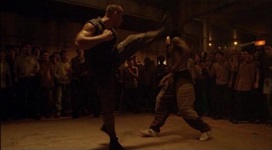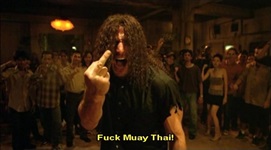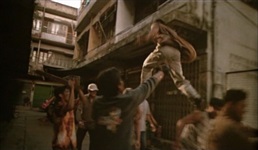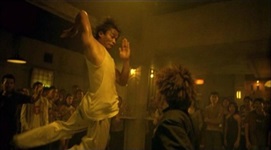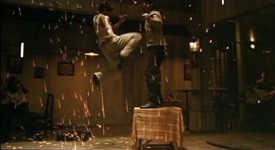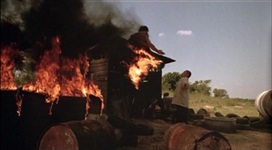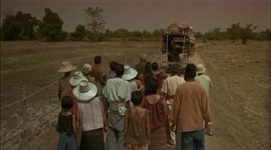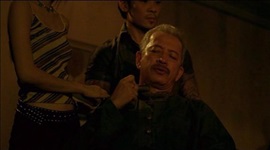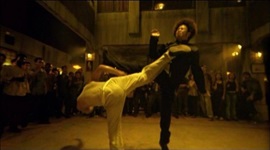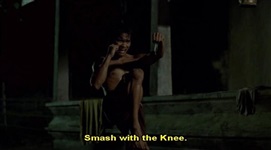Ong Bak (2003)
.jpg)
The head of a rural village's totem Buddhist statue (named Ong Bak) is stolen by a resident's wastrel son. Young Orphan Ting (Tony Jaa) volunteers to travel to Bangkok to recover the head before the important ceremony at the start of the rainy season, since without the statue to bring them luck the village fear a poor harvest.
Once in Bangkok, Ting tracks down another former resident of the village called Ham Lae (Petchtai Wongkamlao) to seek help, but finds that he has been drawn into Bangkok's netherworld of gambling, drugs and prostitution and is much more interested in how he can use Ting to pay off his debts.
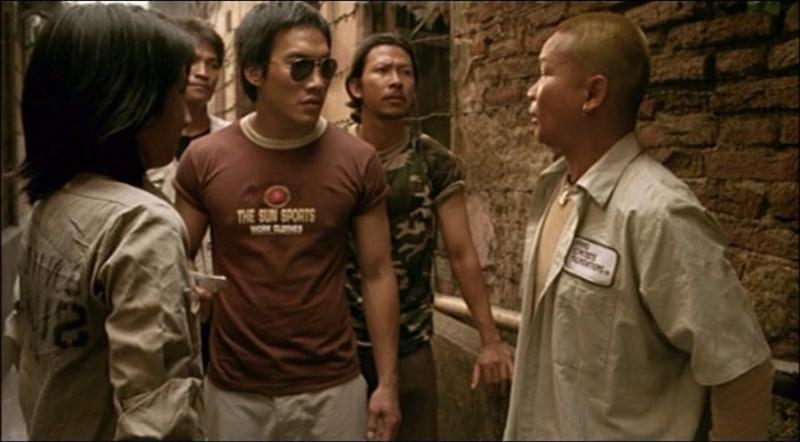
I'm sure I reviewed ONG BAK upon its release in 2003, but the review has been lost to history if so. Since it's a film referenced in so many other reviews, I am trying to 'fill in the gaps'. A decade later it's difficult to remember just how exciting ONG BAK was upon its release. In 2003 fans of martial arts and action films were feeling pretty hard done by. Hong Kong, the undisputed champion of the martial arts film for so many decades, had been in decline since 1997, when a lot of talent fled to Hollywood in the face of the handover to Chinese government and the local economy entered a downward spiral. Martial arts films from the territory were increasingly rare, and far too often they were terrible attempts to emulate Hollywood style action films rather than producing the kind of films that made Hong Kong Cinema synonymous with action films for those in the know for so many years.
The appearance of Crouching Tiger, Hidden Dragon in 2000 had generated great excitement amongst the fan community, with its global exposure bringing hopes of fresh investment and talent into the martial arts genre, and a revitalisation of Hong Kong's industry. Somehow (and I have never understood why) it seemed to have the opposite effect... with their new international exposure, Hong Kong's film-makers seemed to feel the need to be more Hollywood-like in their approach to film-making, with the buzzword being "script" - i.e. "let's write the script before we start filming, for a change". This was a disaster for all concerned... Hollywood was already very good at what it did, and Hong Kong could not even remotely compete on production values or "professionalism", but in trying to do so they seemingly lost the things that made their own cinema so unique and charming - the creativity and imagination, the spirit of "let's just do it", the unpretentious efforts to use what little budget and time they had available in the most exciting way possible.
By 2003 Hong Kong cinema was dead, and the martial arts film with it. The most famous names in the genre were dead (Bruce Lee), getting old (Jackie Chan and Sammo Hung) or wasting their talents in mediocre American product (Jet Li). The new generation of pop idols coming into the industry clearly weren't going to bother investing the time to master kung fu, and the occasional efforts to produce a decent martial arts film were but feeble scraps, which the fans none the less consumed greedily, guiltily. Slowly, grudgingly, we began to accept that an era was over - never again would there be a generation of actors whose education from the age of 5 had been primarily physical, and a culture of film-making which emphasised spectacle and creativity over fame and "professionalism", and where there was continuous competition and pride in choreographing and performing the most outrageous stunts and feats of physical virtuosity that could be executed on camera. Oh well, it was good while it lasted... will the last one to leave please turn out the lights.
_03.jpg)
Then rumours began to surface on the message boards (bear in mind that this was before Facebook took over the internet, and there was a vibrant community of like-minded fans with various virtual meeting places to discuss their obsession) of a new film from Thailand... a new talent whose name (which, at the time, was Phanom Yeerum, not Tony Jaa) could be spoken in the same breath as Bruce Lee, Jackie Chan and Jet Li without having to insert a negative. The buzz was palpable, the excitement building. The fact that the Thai DVD release came unsubtitled wasn't going to stop us (where there's a will there's a way!), and gradually more and more people got to see the film, and reported that... it was all true! ONG BAK really was the saviour of the martial arts genre!
At the time very few people in the West had seen any films from Thailand, it was a largely unknown quantity (I think I'd only seen one - Tears Of The Black Tiger). We didn't know much about Thai culture, about the national sport of Muay Thai, and certainly not about the names Panna Ritikrai and Tony Jaa. ONG BAK was a revelation - a film with reasonably high production values, a script that was not very ambitious but reasonably well written, and action sequences that truly lived up to those of "Golden Age" Hong Kong Cinema. Jaa's talent was prodigious - an agile acrobat and a powerful fighter, effortlessly performing feats that would leave most human beings in pieces on the floor. The stuntmen and fighters were determined to shoot full contact sequences, which were filmed in respectful long shots and takes so that we could appreciate their talent and dedication (in fact the film's biggest flaw is that most of the impressive stunts and moves are shown twice, from different angles - a double take to make sure we didn't miss anything, and could see that yes he really did that, which in practise becomes distracting). It's about 35 minutes into the film before Jaa is let loose, but that first chase sequence through the back alleys of Bangkok instantly became the stuff of legend... to fans who had been subsisting on a diet of over-edited, tightly framed fight scenes designed to obscure the lack of talent of the performers and the use of stunt doubles this was like crack - we were giddy, on a high for months and months, preaching the gospel of ONG BAK to anybody who would listen.
_01.jpg)
It's a different world now, in 2012. ONG BAK truly did revitalise the martial arts movie industry, though not so much in Hong Kong as elsewhere - countries like Japan, South Korea, France and even the USA started producing pure action films, films which understood that the purpose of the action film is to provide spectacle, and the purpose of the martial arts film is to showcase human physical potential, and that an undue focus on sticking to a script or over-planning is detrimental to these ends. Eventually even Hong Kong woke up, abandoning the quest for Hollywood funding and embracing Mainland Chinese investment and talent, with Donnie Yen finally getting over his ego and waging a one-man campaign to restore Hong Kong/China to the top of the martial arts movie food chain. Recently, Indonesia has entered the fray with the remarkable film The Raid: Redemption, which may be the first film to truly surpass ONG BAK in its purity of purpose and the calibre of action on display.
Thailand produced a few more gems in the wake of ONG BAK, but unfortunately the long-anticipated sequels proved to be disappointing. Tony Jaa evidently became infected with ego after the film's success, and decided to write and direct the follow-up himself. The production was famously disastrous, with Jaa himself allegedly disappearing into the jungle for months after realising he was in over his head, until ONG BAK director Prachya Pinkaew agreed to help him finish the film. The result was not what many people were expecting - a prequel set centuries before ONG BAK, and with that film's light, fluffy, tongue-in-cheek tone replaced by a dark, overly pretentious vibe and the gleefully exagerrated acrobatics and stunts of the original giving way to a more technical showcase of Muay Thai techniques. The third film was even worse, and since then all seems to have gone quiet on the Tony Jaa front (the Thai film industry in general has declined, after a brief spurt of investment and exposure following ONG BAK).
_04.jpg)
It's a different world I watch ONG BAK in on a personal level, too. When I first saw it I knew next to nothing about Thailand, but I ended up living there for 3 years and learning to speak Thai - which helps me put a lot of things in the film into a context I didn't have back in 2003. The film's basic themes are easy to understand - modern society has lost its way, with drugs and crime creeping in to fill the void left by the loss of respect for traditional culture, community and religion. Having lived in Thailand and spent time in Bangkok and the more rural parts of the country I can understand these themes in a far more direct and personal way though - I've witnessed it all first hand, and come to know many people's whose life stories strongly resemble those of the characters in ONG BAK. The antagonism between the affluent, cosmopolitan Bangkok Thais and the ethnically distinct people from the much poorer northern regions of Issan which is a major undercurrent in the film is much more transparent to me now (of course the film is grossly romanticised in its view that "traditional Thai culture good, modern Western culture bad"... there is just as much Yaabaa (Methamphetamine), alcoholism and social decohesion in Issan as there is in Bangkok. If it were actually true that traditional village life was as it is pictured in ONG BAK, it would undoubtedly true that it was a better place for young Thais to grow up. Having visited the homes of several Issan natives, I came to conclude that in many cases they are better off getting the hell away from there).
So, watching ONG BAK now is a much different experience for me than it was on its initial release. However, I make a point of trying to understand (and review) films in the context of the time and place in which they were made, and there is no doubt that on its release ONG BAK was a breath of fresh air that resonated throughout the whole world, and a pivotal film in Asian Cinema's history. It reminded everybody what martial arts films were supposed to look like, and inspired a new wave of international efforts to match its achievements. For that, it must surely be applauded!
Cast
Crew
| Director | |
|---|---|
| Action Director | |
| Production Company | |
| Writer | |
| Producer | |
| Editor | |
| Cinematographer |
See also
- 6ixtynin9
- Bangkok Loco
- Banlieue 13
- Born To Fight
- Clash
- Crouching Tiger, Hidden Dragon
- Gerd Ma Lui
- High Kick Girl
- Jailbreak
- Merantau
- Muay Thai - Nai Khanom Thom
- Ong Bak 2
- Ong Bak 3
- Spirited Killer
- SPL 2: A Time of Consequences
- Tears Of The Black Tiger
- The Bodyguard
- The Kick
- The Prey
- The Raid: Redemption
- The Rebel
- The Sanctuary
- Tom Yum Goong
- Tom Yum Goong 2
- Wira
- Yamakasi 2: The Great Challenge
